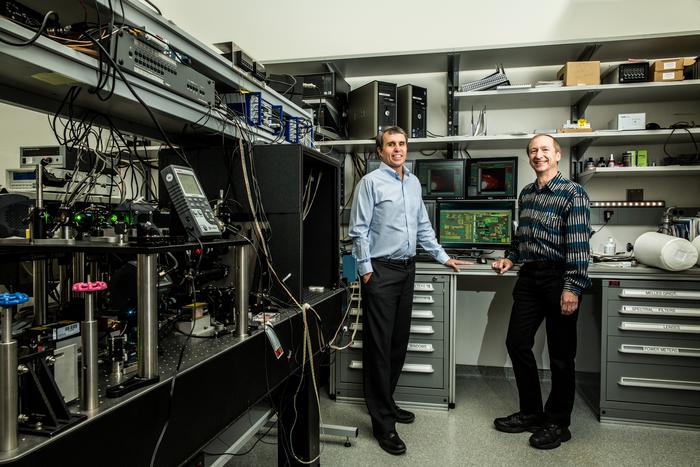Janelia scientists and longtime collaborators Eric Betzig and Harald Hess will be inducted into the 2024 class of the National Inventors Hall of Fame for their invention of photoactivated localization microscopy (PALM), a pioneering imaging technology that enables scientists to image live cells in super-resolution to study biological structures and processes in unprecedented detail.

Credit: HHMI Janelia Research Campus
Janelia scientists and longtime collaborators Eric Betzig and Harald Hess will be inducted into the 2024 class of the National Inventors Hall of Fame for their invention of photoactivated localization microscopy (PALM), a pioneering imaging technology that enables scientists to image live cells in super-resolution to study biological structures and processes in unprecedented detail.
Betzig, a senior fellow at Janelia and an HHMI Investigator at the University of California, Berkeley, and Hess, a senior group leader at Janelia, will be inducted into the National Inventors Hall of Fame on May 9 in Washington, DC, along with 13 other inventors, including HHMI Investigator Xiaowei Zhuang and HHMI Investigator Emeritus James Allison. Founded in 1973 in partnership with the United States Patent and Trademark Office, the Hall of Fame is dedicated to recognizing inventors and invention, promoting creativity, and advancing the spirit of innovation and entrepreneurship.
Developed in 2006, PALM laid the foundation for single-molecule optical microscopy. The imaging technique uses light-activated fluorescent probes that allow scientists to selectively image individual molecules or sets of molecules. Each frame captures a different subpopulation of glowing molecules that are compiled into a single, super-resolved image.
Betzig and Hess each invested $25,000 of their own money to develop a prototype of the PALM system, which they built in two months in Hess’s living room. When the researchers first visited Janelia, where they both became group leaders in 2005, they brought their PALM microscope packed in a carry-on suitcase. Today, PALM is used labs all over the world, and in 2014 Betzig and colleagues received the Nobel Prize in Chemistry for the development of super-resolved fluorescence microscopy techniques, which includes PALM.
Betzig, who was a group leader at Janelia from 2005 – 2018, is a member of the National Academy of Sciences, an honorary fellow of the Royal Society of Chemistry, and has received Caltech’s Distinguished Alumni Award and the AAAS Newcomb Cleveland Prize, among other honors.
Hess is a member of the National Academy of Sciences, a fellow of the American Association for the Advancement of Science and the American Physical Society, and the recipient of the 2023 James Prize in Science and Technology from the National Academy of Sciences.



